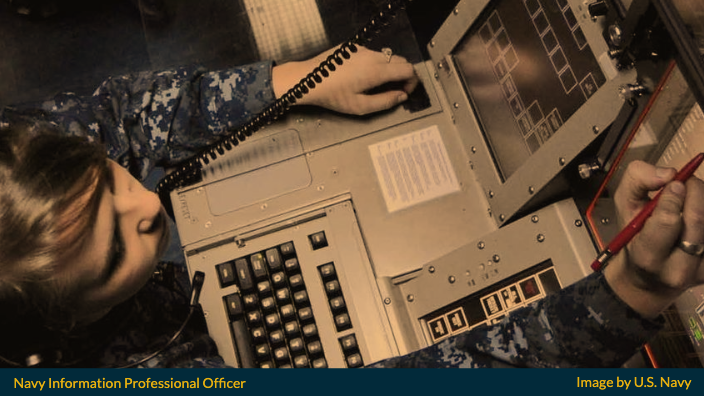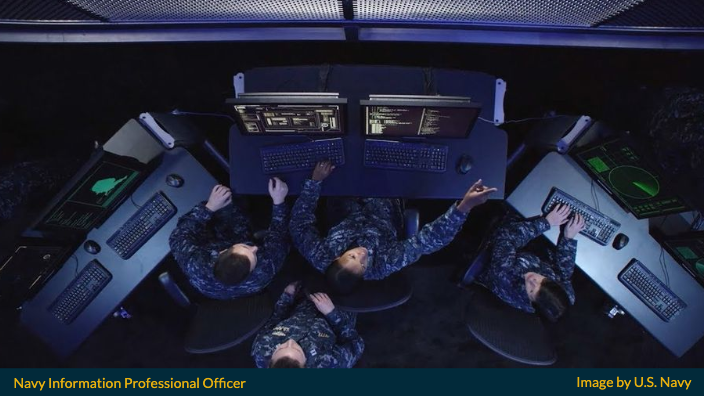Last Updated on March 4, 2024
This guide provides useful information that will help you with your decision to become a Navy Information Professional Officer during Fiscal Year 2024.
As you will see, there are a lot of aspects to this officer program.
Let us start with the basic descriptions.
What is a Navy Information Professional Officer?
Navy Information Professionals (IPs) are Restricted Line Officers who are in charge of the Navy’s networks, cyber defense, computer systems, information and knowledge management, satellite communications, and Command and Control, among many others.

They are the Navy’s Communications and Cyberspace Defensive Operations Officers.
The designator code for Navy IP officers is 1820.
IPs are expected to use their skills to help with maritime operations, from coordination with allies to humanitarian aid and disaster relief, to protecting the country from terrorism and combat operations.
IP officers help our naval forces figure out what they need in order to be able to use command and control effectively at all levels of war, no matter what.
Officers in this community are in charge of making sure that cutting-edge cyberspace systems, global telecommunications systems, and space systems work well even in the most difficult places, like the deep ocean and outer space.
IP officers are both technically skilled and good at communicating.
They can turn complicated technical issues into information that is useful for naval and joint commanders.
IPs know what the Naval Commander wants, so they use technology, information, and knowledge to make sure command and control is strong, the battle space is aware, and the mission goes well.
IP officers plan, acquire, integrate, operate, maintain, and secure networks, communications, and combat systems that support the Navy’s missions.
They make sure they are reliable, available, survivable, and secure, so the Navy can do its job.
Navy IPs are in charge of “Defensive Cyberspace Operations,” which protect Navy information and systems from cyberattackers and keep operations and missions going.
IPs are very important because they help the other services in the Department of Defense, other government agencies, Allied, and Coalition partners work together.
What Does a Navy Information Professional Do?
Information professionals have jobs that are getting more and more difficult, both on and off the water.
During shore tours, this could include working in C4I/Space/Surveillance, being part of Battle Group Staffs on ships at sea, and serving on major Navy and Joint Staffs.
It could also include being in charge of important communication and surveillance facilities around the world, as well.
It is the job of an IP officer to help make sure that information can flow freely.
IPs serve as the first line of defense for networks; they plan out the network platforms of the future; and they make sure the technology and systems that support Navy operations work well together.
IPs are experts in information systems, command and control, and space systems.
They use technology, information, and knowledge to make sure that battle space is dominated and missions go well.
IPs are leaders in the Information Domination Corps (IDC), which is a group of highly specialized information experts who work across the surface, subsurface, air, space, and cyberspace domains.
With shared functions, capabilities, and resources, IDC members use their skills to make better decisions and get the most out of sensors, weapons, network communications, and control systems for national security and war.
Decision-making, intelligence, knowledge of the maritime environment, and knowledge of how ships work all depend on the work of Information Professionals.
When you work as an IP, you will help plan and acquire the Naval network and the systems that support Navy operations and business processes.
In this job, you will be in charge of the Navy’s network warfare missions, which means you will be in charge of developing tactics, techniques, and procedures that will help the Navy win at sea and on land.
You will also be in charge of making sure that the Navy’s organization is working as well as it can.
How to Become a Navy Information Professional
If you are interested in becoming a Navy Information Professional officer, you must first be aware that earning a commission in the United States Navy is very competitive, especially the Navy IP officer program.
Note that this is slightly different from applying for a civilian public affairs position because Navy IPs directly affect national security.
Know that you will be held to a higher standard of performance and behavior compared to your civilian counterparts.
If that did not deflate you, you may have the right sense of pride and integrity for this job.
To become a Navy Information Professional Officer, applicants must be American citizens who are 18 to 42 years old with at least a Bachelor’s degree in a technical field and a GPA of at least 3.0 on a 4.0 scale. Navy IP applicants must also score at least a 50 on the Officer Aptitude Rating (OAR) exam and have professional experience in fields such as cybersecurity, network operations, or communications.

Here are the step-by-step procedures to become a Navy IP officer, along with the various Navy Information Professional Officer requirements:
Step 1: Determine your eligibility
You must first determine your eligibility to compete for a Navy IP position before contacting your recruiter.
The basic eligibility requirements for the Navy IP officer program listed below are current as of May 2022, per the Navy Personnel Command. No updates have been issued so far.
Navy Information Professional Eligibility Requirements
| Citizenship | Navy IP officer program applicants must be U.S. citizens. The fact that you are both a US citizen and a citizen of another country does not mean you will not be able to get selected. |
| Age | Applicants must be at least 18 years old and not more than 42 years old when they are commissioned. |
| Education | All IP program applicants are required to have at least a bachelor’s degree from an accredited institution. Applicants who have majors in fields like electrical engineering, computer science, or cybersecurity are most likely to be selected for this job. Applicants are not required to have these majors, but they are a big help. On a scale of 4.0, an undergraduate cumulative grade point average (GPA) of 3.0 or more must be achieved. GPA is waiverable down to 2.5 on a 4.0 scale. Calculus I and II and calculus-based physics with a “C” grade average or better is preferred. |
| Physical | In accordance with the Manual of the Medical Department, Chapter 15, selects must be able to serve at sea and around the world. |
| Aptitude | IP officer program applicants must take the Officer Aptitude Rating (OAR) test. A score of 50 or more is required. This is waiverable. |
| Work Experience | Prior experience in fields such as cybersecurity, network operations, or communications is essential. Candidates who have one or more of the following Navy-preferred certifications will be given extra attention: GIAC, Global Security Leadership Certification, Certified Information Security Manager, CompTIA Security+, and/or GIAC Information Security Fundamentals (GISF). |
| Leadership | Having a quantifiable record of leadership, management, or supervisory experience in academia, civilian, or military organizations is very important. |
| Security Clearance | Applicants must be eligible for access to classified information and must meet the Director of National Intelligence’s (DNI) and Intelligence Community Directive (ICD) 704 eligibility standards, which are set by the government. Applicants who are recommended for a commission must meet with the local special security officer before being chosen as an officer candidate. |
| Time in Service | Enlisted individuals from the regular Navy, Navy Reserve (active and inactive), or other military services must have no more than 72 months of qualifying service. Waivers may be given for up to 120 months of qualified service, but not more than that. |
Step 2: Prepare your professional resume
If you have not prepared a current resume or curriculum vitae, it is best to start now. Once you contact your local recruiter, they will ask you for your current resume in order to apply for the IP officer program.
Your local officer recruiter may even ask you for a resume that is signed and dated by hand.
Step 3: Contact local officer recruiter
You then must contact your local officer recruiter. They will be able to provide you with the current Navy IP officer position availability, and any other nuanced requirements for the upcoming Navy Information Professional Officer selection board.
The recruiter will ask you to provide basic identification documents as proof of eligibility (eg. birth certificate, passport, social security card, etc.), along with your college transcripts and current resume.
Step 4: Take the Officer Aptitude Rating (OAR)
Once the officer recruiter verifies your basic eligibility, they will schedule you to take the Officer Aptitude Rating (OAR) exam.
An OAR score of 50 or more is required for all IP applicants. This requirement may be waived.
The most crucial requirement that you can fully control is your OAR score. It is the primary objective criteria upon which all applicants are compared against.
To maximize your chances of obtaining an exceptional OAR score, we only recommend this OAR Study Guide for your success. All others are mediocre at best.
Step 5: Complete Navy NASIS
Prior to commissioning, a National Agency Check, Local Check inquiry, or its equivalent must be completed.
The Navy Accessions Security Information System (NASIS) collects information from prospective Naval Officers in order to launch personal security investigations for all Navy personnel.
To begin an inquiry, the information for a security clearance investigation is submitted to the Joint Personnel Adjudication System (JPAS).
NASIS is the Navy’s data collecting mechanism for security clearances, and it communicates with JPAS.
Prior to commissioning, all future Navy Officers must complete the SF-86 request for security clearance and have an open investigation.
Your recruiter will provide you guidance on how to log in to your NASIS account. You must complete this as accurately as possible.
Step 6: Complete Physical Exam at MEPS
Once you submit all medical paperwork to your officer recruiter, they will schedule you for your full physical exam at MEPS.
MEPS (Military Entrance Processing Stations) are joint-service facilities run by the Department of Defense that employ both military and civilian personnel.
MEPS evaluates applicants based on their physical qualities, intelligence, and moral standards as defined by each branch of military service.
Hotel accommodation may be available for MEPS upon request.
Step 7: Acquire professional references
Navy IP officer program applicants may acquire endorsements from Senior Navy Officers or senior enlisted, whether active duty, reserve, or retired, to be included in the application.
Prior or current work supervisors or college professors are typical references of Navy Officer applicants.
Step 8: Write motivational statement
The Officer Selection Board receives complete information about you from the Application Processing and Summary Record (APSR).
Within the APSR form, there is space to write a motivational statement. You must ensure that your motivational statement fits within the allotted space in the APSR form.
Your motivational statement should answer the following questions:
- Why do you want to be a Navy Information Professional Officer?
- Why do you want to be a Naval Officer?
- What do you offer to the Navy?
- Why should the selection board choose you?
Step 9: Complete application paperwork
At this point, your officer recruiter will present you with some paperwork that is required to be submitted with your application.
Complete these forms as accurately and promptly as you can.
Once complete, your application for the Navy IP program will be submitted to the Navy Information Professional Officer selection board.
Selection results typically are released 30 to 45 days after the Navy Information Professional Officer selection board convening date.
Navy Information Professional Service Obligation
Selects will have to be on active duty for four years from the date they are commissioned.
The obligation starts when the person is commissioned.
The rest of the service, enough to complete the 8 years of obligated service, can be served in a ready reserve status.
Navy Information Professional Training
Officer Candidate School (OCS) is required for anyone who wants to be an Information Professional Officer. It is in Newport, RI.
Also Read: Navy OCS Guide for Officer Applicants
After they finish the Navy OCS, they usually go to Virginia Beach, VA, for a 5-week IP Basic Course before or during their first job.
IPs then have to meet certain standards as part of their operational training while on Fleet tours.
They are also expected to look for more advanced education opportunities.
In the course of their work, they might be able to get credentials and certifications from a number of national boards and organizations.
Promotions happen all the time, but they are competitive and based on how well you do.
Officer Candidate School
The Navy Officer Candidate School (OCS) is one of 4 officer training schools at Naval Station Newport in Rhode Island. It is one of the four schools.
This 13-week course is meant to give you a working knowledge of the Navy, both afloat and on land, so that you can get a job with the world’s best Navy.
This is what you need to do in order to get that honor. In order to get that honor, OCS will make sure that you can be both a good leader and a good naval officer all over the world.
At OCS, your personal Honor, Courage, and Commitment will be put to the test.
You will be asked to live up to the highest standards of these values.
Navy IP Officer Training Pipeline
New IP officers go to a lot of training courses:
The Information Professional Basic course is 20 weeks in Virginia Beach, VA, before you start your first job.
Among the topics covered in the class are fleet communications, networks, and cybersecurity.
The Information Warfare Basic Course teaches new officers about the wide range of skills that make up the community of people who work in the field of information warfare.
The Division Officer Leadership Course helps new officers get ready for their new jobs.
Navy Information Professional Career Opportunities
All over the world, IP Officers work in communications and networks.
They work on ships at sea and in units ashore, special forces, Cyber Mission Forces, the White House Communications Agency, and on major Navy and Joint staffs.
This is true for IP jobs as well. It does not matter if you live in Norfolk or San Diego or Pearl Harbor.
IPs are stationed at all the Navy’s big bases. All of these command staffs, as well as NATO, have IPs.
There are also IPs in Joint and Coalition commands, like the Joint Staff and the Defense Information Systems Agency (DISA).
IP officers must pass a series of IP-related tests and become Information Warfare Officers in order to work for the government.
Navy Information Professional Education Opportunities
Information Professionals can get more education through the Service members Opportunity Colleges Navy (SOCNAV) Degree Program, by applying for jobs at institutions like the Naval Postgraduate School (NPS) or the Navy War College (NWC), and by taking Joint Professional Military Education (JPME) at one of the different service colleges.
It is very important for people who work as Information Professionals to get a lot of postgraduate education.
Most IPs will go to the Naval Postgraduate School to get a master’s degree in C4I, space, information systems, computer science, modeling and simulation, or some other field, like computer science.
There is a chance to get a graduate certificate at National Defense University or NPS, as well as very important DoD certifications.
Federal Executive Fellowships, Information Assurance Scholarships, and internships may also be available, but it is not certain.
More Information
If you want more information about becoming a Navy Information Professional officer, the next logical step is to contact a Naval Officer Recruiter.
Let us start figuring out how you can benefit from becoming a Navy IP officer – or if it is even the right move for you, considering your current life situation.
You might also be interested in:
Hope this was helpful for your career planning.


